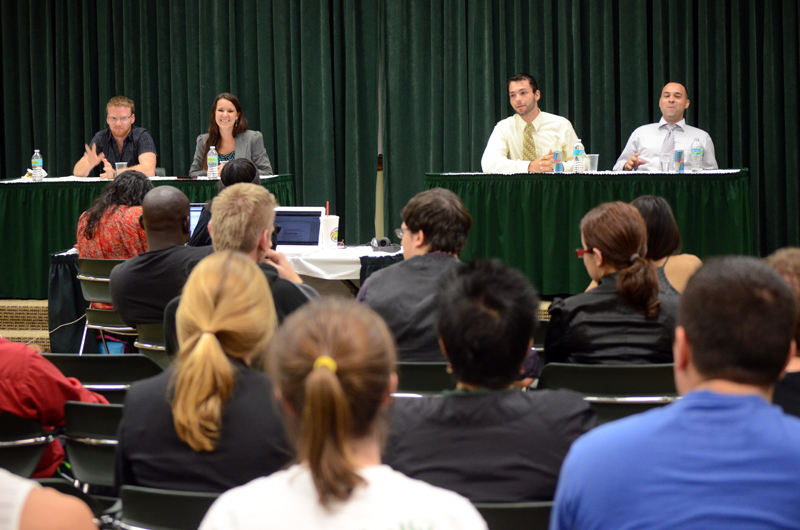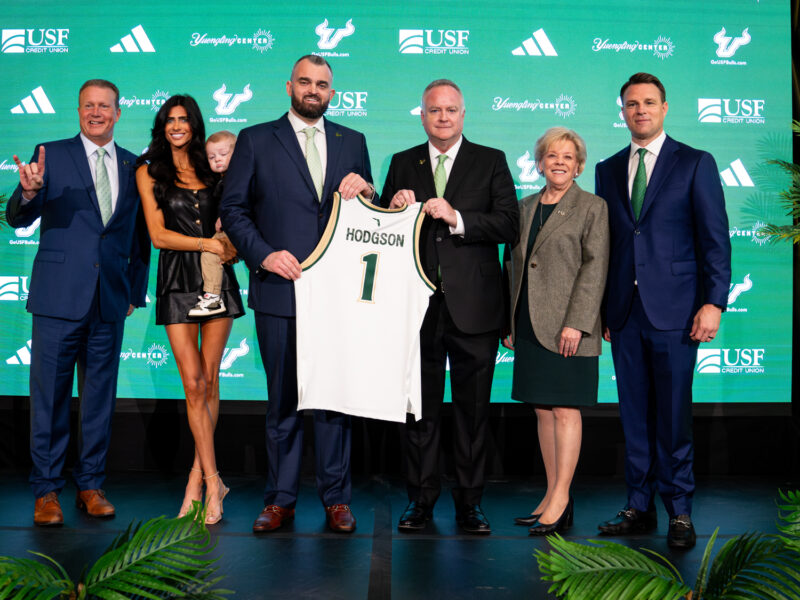After days of schedule conflicts and finger-pointing, the candidates for the student government election met Wednesday night for a last-minute debate.
The two presidential candidates, James Scott, a current senator and former student president, and Mark Lombardi-Nelson, the current vice president, reiterated their different visions for the role of the government on campus.
Lombardi-Nelson said that the government has a central role in creating “real college experiences,” establishing traditions and taking an active role in club-hosted events. He also wants to provide free printing for students, paid for with the budget of activities and service fees allocated to SG.
Scott said the government needs to run efficiently to provide services and funding for students, but seeing the government as central to campus life was an overreach.
Scott and running mate April Parsons, the current Senate president, are calling themselves the “sustainability” candidates, based on his strong support for environmental policies and specifically, the adoption of the American College & University Presidents’ Climate Commitment on campus.
The bill has been passed by the Senate three times and sent to SG President Courtney Parish, who has yet to sign the commitment. She supports the initiative, she said, but has held off for strategic reasons. In order to go into effect, the initiative will also have to be supported by Regional Chancellor Margaret Sullivan.
Campus safety is a priority for both campaigns, the candidates said, but they differ on execution. Scott said he would rely on the expertise of the campus police department. Lombardi-Nelson’s vice president pick, Quincy Lopez, the current SG Veterans Liaison, said the revitalization of the SAFE team, a group of student volunteers armed with walkie-talkies and golf carts, is a top priority.
With only 21 hours between the start of the debate and the closing of polls Thursday at 5 p.m., and with much of the audience comprised of senate candidates and current student government members, it is unlikely the debate will sway the final result.
However, the night was a rare respite from the bitterness that has defined student government for much of the past year, even as members cast red flags at each other during the day.
Sen. William Nicks levied accusations of incompetence and malfeasance against Senate President Parsons at the general assembly meeting held earlier in the day. Among the accusations, Nicks wrote that Parsons ignored statutes when Nicks was made Chair of the Appropriations Committee position vacated by Walter “Charlie” Shelmet when Shelmet became Attorney General.
According to SG statutes, the vice chair of the committee, then James “Jimmy” Richards, should have filled the vacant seat. Instead, Nicks was voted into the position. A later “vote of confidence” by the rest of the Senate forced Richards out, making Nicks’ appointment official.
Nicks also accused Parsons of violating “Government-in-the-sunshine” laws, the state’s open meeting laws; failing to update legislation tracking schedules; indifference to requests by the student president to attend “high-level meetings”; and failure to meet the dress code during an emergency session held minutes before the government was to leave for a weekend retreat.
Former Senate President Christian Haas, now a non-degree seeking student and employee of the university, later said the accusations were easily debunked.
The memo was signed by several other SG members, including Shelmet and Parish, highlighting the strict divide between the two distinct factions in the student government.
An impeachment committee comprised of Sens. Jordan Iuliucci, Michael Jernigan and Christa Hegedus was selected to weigh the accusations. The process could take more than four weeks before seeing a final vote.
Nicks is not running for reelection.
As USFSP establishes more campus housing, a dining service and other programs typical of a traditional university, the mostly-empty room during the debate might indicate greater problems than sloppy parliamentary procedure. Both candidates were asked how SG can reconnect with the vast indifferent majority of students on campus.
Leadership training, including retreats and instruction, is the key to de-stalling the government and creating professional legislators and leaders, Scott said.
The only thing the government needs to start functioning is better communication and cooperation, Lombardi-Nelson said. SG members need to get out and speak with the students, he added.
Regardless of their decisions, Lopez said, the most important thing was to encourage other students to get out and vote. People around the world die for the right to vote, he added.
Degree-seeking graduate and undergraduate students can vote on Blackboard until 5 p.m. on March 8.



